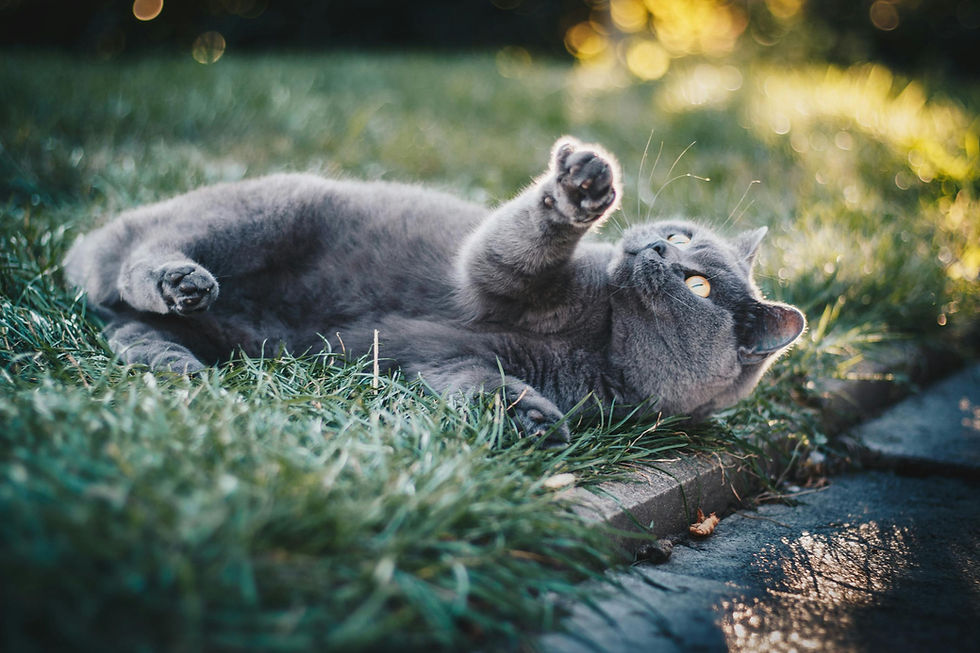Cat Eye Health: What You Should Know
- Snappy Tom Pet Supply
- Sep 28, 2022
- 3 min read

They say eyes are the windows to the soul, but perhaps more accurately, they can offer insights into a cat’s overall health. Taking note of your cat’s baseline physical condition can help ensure you notice any changes that might indicate an illness, and your cat’s eyes are no exception.
Healthy cat eyes are clear, bright, and free of redness. The pupils should be equal in size, the iris should be consistent in colour, and there should be little to no discharge apparent.
If you notice changes in your cat’s eyes, monitor them closely and contact your vet. While many cat eye issues are treatable, in some cases, it’s essential to act quickly to avoid potential vision loss.
Below, we’ll cover symptoms to look out for and some of the most common eye issues afflicting cats.
Symptoms of unhealthy eyes
Changes to the colour, clarity, and position of your cat’s eyes can all be signs that your cat is experiencing an eye issue. Sunken eyes could be a symptom of dehydration, while a bulging eye might indicate the presence of a tumour. Colour changes in the iris, clouding of the cornea, redness, or excessive eye discharge could also suggest a problem.
Behaviour changes can be indicative of eye issues too. If you notice your cat pawing or scratching at their eyes, squinting, or blinking excessively, they could be experiencing pain or irritation in their eyes.
These symptoms could point to an infection or injury but could also be signs of a more serious underlying illness. With that in mind, here are some common eye issues that affect cats.
Common Cat Eye Problems
Conjunctivitis (Pink Eye)
Conjunctivitis is a condition that causes inflammation in the mucous membrane lining the inner surface of a cat’s eyelid. It is a very common eye disorder and can be caused by environmental allergens, bacterial infections, or viruses. The most common symptoms of conjunctivitis are redness, discharge, and excessive blinking. Though it can cause your cat discomfort, you can treat conjunctivitis with medication.
Uveitis (Eye Inflammation)
Uveitis is a feline eye condition in which the uvea, a part of the eye containing the iris and surrounding tissues, becomes inflamed. Uveitis is painful and can lead to blindness if it isn’t treated. Symptoms of uveitis include discoloration of the iris, squinting, light sensitivity, redness, and excessive blinking.
This condition has many potential causes, including trauma to the eye, high blood pressure, and infection. Fortunately, there are treatment options for uveitis, but your cat’s prognosis depends on the severity of the condition.
Glaucoma
Glaucoma is a condition in which fluid cannot drain from the eye, causing it to build up and put pressure on the optic nerve. This can lead to nerve damage and loss of vision. There are two types of glaucoma, primary and secondary. Primary glaucoma is hereditary, while secondary glaucoma can come about as a result of injury or illness, including as a side effect of uveitis. Signs of glaucoma include cloudy eyes, squinting, and dilated pupils. Unfortunately, there is no cure for glaucoma in cats, but you can treat it with medicated eye drops.
Cataracts
Cataracts are a condition that causes the lens of a cat’s eye to become clouded, resulting in partial or total vision loss. Cataracts are a relatively common condition in aging cats, but they can also develop due to trauma or illness. Cataracts can sometimes be treated with medications or reversed with lens transplant surgery, but cats often adjust to the changes in their vision.
The Bottom Line
One of the best ways to promote cat eye health (and their health in general) is by feeding your cat a balanced diet. Taurine is an amino acid that is important for vision support and it can only be found in animal proteins. Snappy Tom Lites include taurine and vitamin supplements that will help keep your cat fit, healthy, and strong.
Your cat’s eyes convey a lot about their overall health, which is why you should take any changes to their eyes seriously. Make a habit of checking your cat’s eyes regularly to ensure they appear healthy. If you notice any changes, contact your veterinarian about having your cat’s eyes checked.







.0